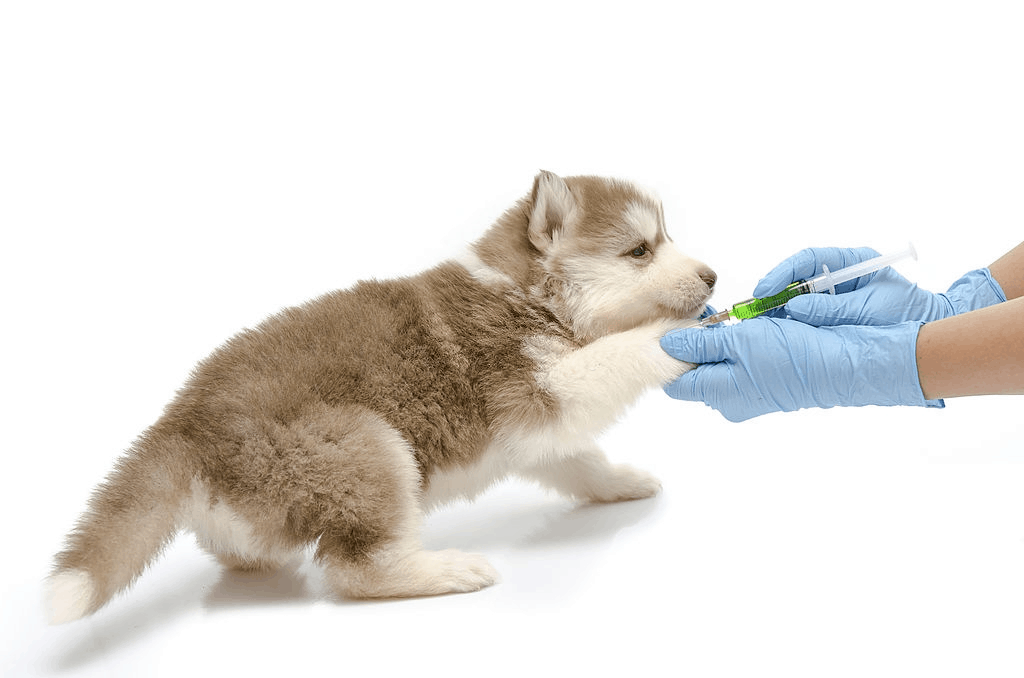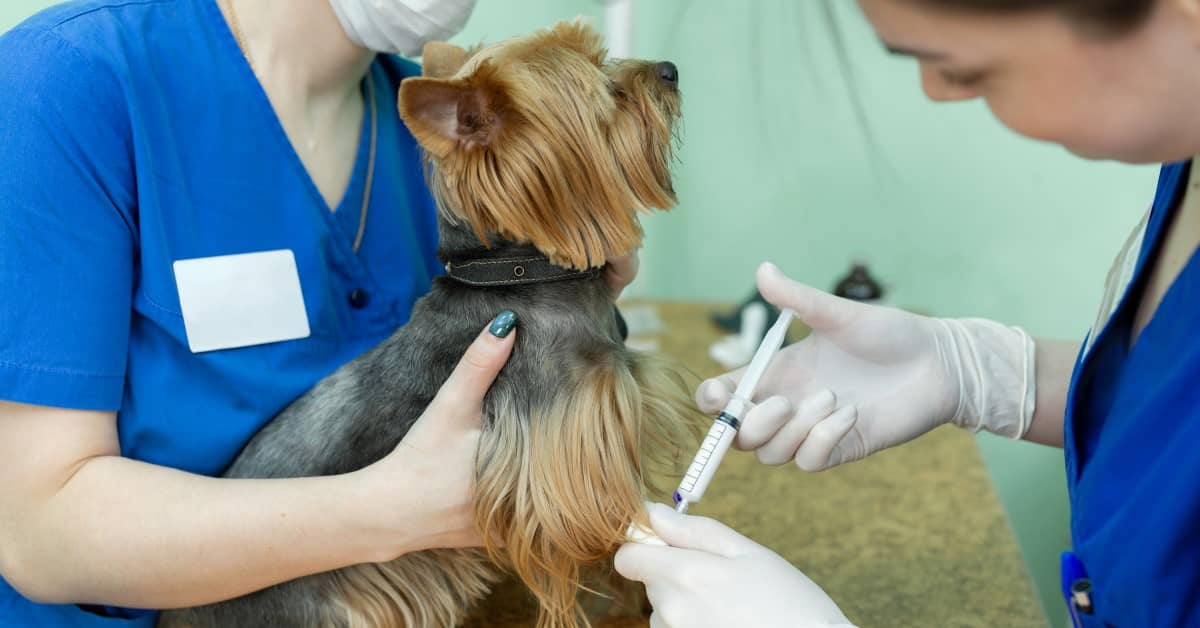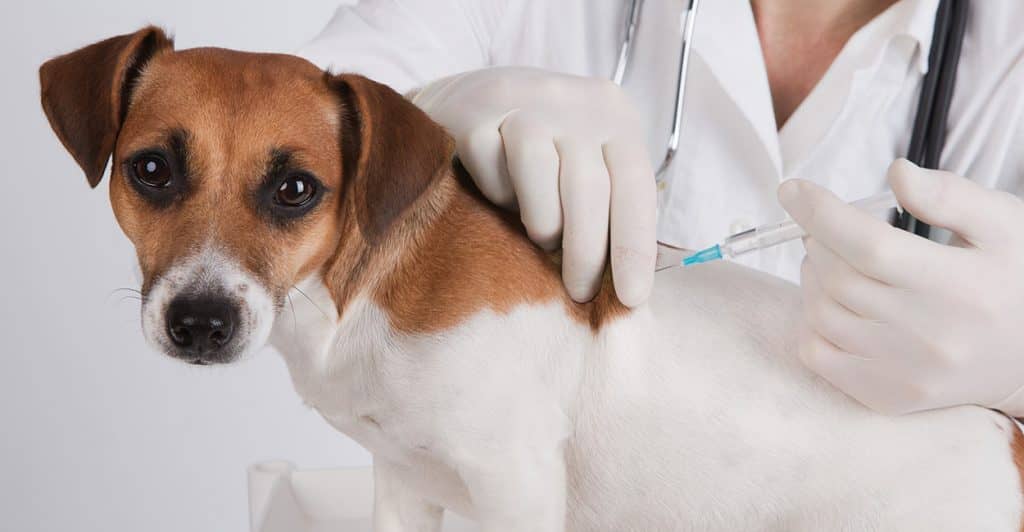
When it comes to adopting a new furry friend, one of the most important things new pet owners need to consider is their puppy’s vaccination schedule. Vaccinations are essential in protecting puppies from various diseases and illnesses that could be life-threatening if left untreated.
As such, every responsible dog owner must ensure that their puppy receives all the necessary vaccinations at the appropriate time. A proper puppy shot schedule typically comprises both core and non-core vaccines, which serve separate purposes in safeguarding your pup’s health.
Core vaccinations are required by law in most states and protect puppies against highly contagious and potentially deadly diseases like rabies, canine distemper, parvovirus, and hepatitis. Non-core vaccinations are optional but still recommended for puppies who may be exposed to certain risks based on their breed or lifestyle choices.
By following a comprehensive puppy vaccination schedule, you can rest assured knowing that your four-legged friend is well-protected from potential health hazards.
Key Takeaways
- Proper puppy shot schedule includes both core and non-core vaccines.
- Core vaccinations are required by law in most states and protect against highly contagious and potentially deadly diseases like rabies, canine distemper, parvovirus, and hepatitis.
- Non-core vaccinations are optional but still recommended based on breed or lifestyle.
- Age-specific vaccinations and booster shots are crucial in maintaining strong immunity and preventing future infections.
Understanding the Importance of Vaccinations for Puppies

Vaccinations are crucial for puppies, so it’s important to understand their importance. Not only do vaccines protect against dangerous diseases, but they also prevent the spread of these illnesses to other dogs and humans.
Vaccines work by introducing a small amount of the disease into the puppy’s body, which triggers an immune response that prepares them to fight off future infections. However, while vaccine effectiveness is high, there can be some side effects.
These can include mild symptoms like fever or lethargy, as well as more serious complications such as allergic reactions or seizures. It’s essential for pet owners to carefully monitor their puppies after vaccinations and report any concerns to their veterinarian.
The benefits of vaccines far outweigh the risks, but being aware of potential side effects allows pet owners to take appropriate action if necessary.
Core Vaccinations for Puppies

Core vaccinations for puppies are crucial to protect them from harmful diseases. Every puppy should receive four main core vaccines: distemper, parvovirus, hepatitis, and rabies. These diseases can cause severe health problems and may even lead to death if left untreated.
Adjusting the paragraph structure in this way allows each sentence to stand on its own and be more easily digestible for the reader. Additionally, using contractions makes the text more conversational and approachable.
Distemper
When it comes to protecting your new furry friend from deadly diseases like distemper, you’ll want to make sure they receive the proper vaccinations at the right times.
Distemper is a highly contagious virus that affects dogs and other animals, and can lead to serious illness or even death if left untreated. Here are three important things to know about distemper prevention:
-
Vaccinations: The best way to prevent distemper is through vaccination. Puppies should receive their first distemper vaccine when they’re between 6 and 8 weeks old, followed by booster shots every 3-4 weeks until they’re around 16 weeks old. Adult dogs should also receive regular booster shots throughout their lives.
-
Signs and Symptoms: If your dog does contract distemper, it’s important to be able to recognize the signs and symptoms so you can get them treated as soon as possible. These may include fever, coughing, sneezing, discharge from the eyes and nose, vomiting, diarrhea, seizures, and paralysis.
-
Treatment: Unfortunately, there’s no cure for distemper once a dog has contracted the virus. However, supportive care such as fluids and medications can help manage symptoms and increase the chances of recovery. Prevention through vaccination remains the best option for keeping your furry friend safe from this dangerous disease.
Parvovirus
Did you know that parvovirus is a highly contagious disease that can affect dogs of all ages? It is caused by the canine parvovirus which attacks rapidly dividing cells in the body, particularly those in the intestines. This leads to severe vomiting and diarrhea, which can quickly lead to dehydration, weight loss, and even death if left untreated.
Prevention measures for parvovirus include keeping your puppy away from unvaccinated dogs and areas where infected feces may be present. Puppy vaccinations are also critical in preventing this disease. Symptoms of parvovirus include lethargy, loss of appetite, vomiting, and diarrhea with blood. If you suspect that your puppy has contracted this virus, it’s essential to seek treatment immediately as early intervention is crucial for survival. Treatment typically includes supportive care such as fluids and electrolytes to combat dehydration along with medication to control vomiting and diarrhea. With prompt attention from a veterinarian and proper care at home afterward, most puppies recover completely from this illness.
| Vaccine Type | Age Given | Booster 1 | Booster 2 | Booster 3 |
|---|---|---|---|---|
| DHPP | 6-8 weeks | Yes | ||
| 9-11 weeks | Yes | |||
| 12-14 weeks | Yes |
This table shows the recommended vaccination schedule for puppies against parvovirus along with other common diseases like distemper and hepatitis (DHPP). As seen above, there are three booster shots recommended after the initial vaccine dose at six to eight weeks old. Following this schedule will give your puppy optimal protection against these potentially deadly illnesses while ensuring their long-term health and well-being. Remember that prevention is always better than cure when it comes to protecting your furry friend!
Hepatitis
Hepatitis, caused by a virus attacking the liver, can affect dogs of all ages and result in symptoms such as lethargy, vomiting, and yellowing of the eyes. This disease is transmitted through contact with infected dogs or their bodily fluids.
Fortunately, there are several Hepatitis prevention strategies that can be implemented to protect your furry friend. One of the most important steps is to ensure that your dog receives proper vaccinations according to a puppy shot schedule recommended by a veterinarian.
If Hepatitis does occur in your dog despite preventive measures, timely treatment is crucial for recovery. Treatment usually involves supportive care such as fluid therapy and medications to control vomiting and liver inflammation.
It’s important to note that this disease can have serious consequences if left untreated or if it progresses rapidly. Therefore, early detection and prompt veterinary assistance are critical in managing this condition.
By staying informed about Hepatitis prevention strategies and promptly addressing any concerning symptoms in your pet, you can help keep them healthy and happy for years to come!
Rabies
To protect your furry friend from Rabies, it’s important to ensure they receive proper vaccinations according to a veterinarian’s recommendations. Rabies prevention is crucial as this viral disease can lead to severe health complications and even death in both animals and humans.
Here are three things pet owners should know about Rabies prevention:
- The first step towards Rabies prevention is getting your pet vaccinated against the virus. In most states, it’s a legal requirement for pets to be vaccinated against Rabies. Vaccines help build immunity against the virus and can prevent your pet from contracting the disease in case of exposure.
- It’s important to recognize early symptoms of rabies in pets such as changes in behavior, aggression, difficulty swallowing, and excessive salivation. If you suspect that your pet has been exposed or shows symptoms of the virus, seek immediate veterinary attention.
- Pet owners must also follow local laws and regulations related to Rabies prevention. This includes keeping their pets on a leash while outside and avoiding contact with wild animals such as bats or raccoons which may carry the virus.
By taking these precautions, we can ensure our furry friends stay healthy and happy!
Non-Core Vaccinations for Puppies
Non-core vaccinations are additional shots that may be recommended for puppies, depending on their lifestyle and risk factors. Three common non-core vaccines for puppies include Bordetella, Lyme disease, and Canine influenza. These vaccines can help protect puppies from respiratory infections, tick-borne illnesses, and contagious viruses that can spread quickly in social settings like dog parks or kennels.
Adjust the paragraph structure in the input to logically group complete sentences on their own lines, with a double new line after. Use contractions.
Bordetella
Bordetella, also known as kennel cough, is a vaccine that helps protect your puppy’s respiratory system and acts as a shield like armor. This non-core vaccination is highly recommended for puppies who are frequently exposed to other dogs in public areas such as dog parks or boarding facilities.
While it may not be necessary for all puppies, vaccination can prevent the spread of kennel cough and other respiratory infections that could lead to more severe illnesses. Prevention tips for kennel cough include keeping your puppy away from sick dogs and avoiding crowded public places until he or she has completed their vaccinations.
If you suspect your puppy has been exposed to kennel cough, it is important to monitor their symptoms closely and seek treatment options if necessary. Treatment may include medication to reduce coughing and antibiotics if a bacterial infection is present.
With proper prevention measures in place, Bordetella can help keep your furry friend healthy and happy for years to come.
Lyme disease
As mentioned earlier, Bordetella is a common respiratory infection in dogs that can be prevented through vaccination. However, this isn’t the only threat that puppies face as they grow up. Another serious illness that can affect dogs is Lyme disease. This bacterial infection spreads through tick bites and can cause severe symptoms if left untreated.
Prevention measures are key when it comes to Lyme disease. Regular tick checks and the use of tick prevention products are highly recommended for all dogs, especially those living in high-risk areas. Symptoms of Lyme disease include fever, joint pain, lethargy, and loss of appetite. If your puppy displays any of these symptoms after a tick bite or exposure to ticks, seek veterinary treatment immediately. Treatment usually involves antibiotics and supportive care to help manage the symptoms. Remember: prevention is always better than cure!
- Nested bullet point list:
- Sub-list 1:
- Don’t let your dog roam freely in wooded or grassy areas where ticks are commonly found.
- Check your dog thoroughly for ticks after walks or hikes.
- Sub-list 2:
- Schedule regular vet check-ups so that you can catch any potential health issues early on.
- Invest in preventative treatments such as flea/tick collars or topical solutions.
By taking preventative measures and being aware of the symptoms associated with Lyme disease, pet owners can help protect their furry friends from this potentially dangerous illness. After all, our pets rely on us to keep them healthy and safe – it’s our duty to do everything we can to fulfill that responsibility!
Canine influenza
You may have heard of canine influenza, a highly contagious respiratory infection that can spread quickly among dogs. Canine flu is caused by two different strains of the influenza virus: H3N8 and H3N2. The symptoms of canine flu are similar to those of human flu, including coughing, sneezing, fever, lethargy, and loss of appetite.
Prevention is key when it comes to protecting your furry friend from the canine flu. One way to reduce the risk of infection is to vaccinate your dog against both strains of the virus. Additionally, avoiding contact with infected dogs and cleaning and disinfecting shared items such as water bowls and toys can help prevent the spread of the disease.
If your dog does contract the canine flu, treatment typically involves supportive care such as fluids and rest. In severe cases, antiviral medication may be prescribed by a veterinarian.
Puppy Vaccination Schedule
The puppy vaccination schedule is an essential aspect of responsible pet ownership. Age-specific vaccinations are crucial to ensure that puppies receive the necessary protection against harmful diseases.
Booster shots are also an important part of the vaccination schedule, as they help maintain a strong immunity and prevent future infections.
Age-specific vaccinations
Pups need to receive their age-specific vaccinations in a timely manner to ensure their immune systems are properly protected. Vaccination frequency is determined by the pup’s age and risk of exposure to certain diseases. For example, puppies typically receive a series of shots between 6-16 weeks old, with boosters given every 2-4 weeks.
As they grow older, some vaccines require annual boosters while others only need to be administered every three years. Vaccination efficacy is also important to consider when determining a puppy’s shot schedule. Some vaccines may not provide immediate protection and may require multiple doses before full immunity is achieved.
It’s essential for pet owners to consult with their veterinarian and follow the recommended vaccination schedule for their specific puppy. By doing so, they can help protect their furry companions from preventable illnesses and ensure they live long, healthy lives. Common age-specific vaccinations include distemper, parvovirus, hepatitis, and rabies.
Puppies should be vaccinated against certain diseases even if they are kept indoors. Some vaccines may have mild side effects such as lethargy or decreased appetite. If a puppy misses one or more vaccinations in its series, it may need to start the series over again.
Booster shots
Don’t forget to keep track of when your furry friend is due for their booster shots! Just like with the initial puppy vaccinations, booster shots are crucial in protecting your dog from a variety of illnesses. These boosters help to reinforce your pup’s immune system and ensure that they stay healthy throughout their life.
The frequency at which your dog will need booster shots depends on a few factors such as the type of vaccine and your dog’s lifestyle. Generally, most dogs will need booster shots every 1-3 years. However, some vaccines may require more frequent boosters or less frequent ones depending on the specific disease being vaccinated against. It’s important to consult with your veterinarian to determine the appropriate schedule for your furry friend. Additionally, while side effects from booster shots are typically mild, it is possible for some dogs to experience reactions such as fever or lethargy after receiving their vaccinations. If you notice any concerning symptoms post-vaccination, be sure to contact your vet immediately.
What to Expect During and After Vaccinations
As your furry friend receives their vaccinations, it’s like putting armor on them to protect against future illnesses. However, it’s important for pet owners to know what to expect during and after the vaccination process.
Common side effects of vaccines include mild fever, lethargy, and soreness at the injection site. These side effects usually last for a day or two and are nothing to worry about.
If you’re concerned about these side effects or prefer not to vaccinate your puppy, there are alternative options available such as titer testing. Titer testing measures the level of antibodies in your puppy’s blood and can determine if they have enough protection against certain diseases without needing a vaccine.
However, keep in mind that some states require proof of vaccination for licensing purposes and most boarding facilities also require up-to-date vaccinations for admittance. It’s important to discuss all options with your vet before making any decisions regarding your puppy’s health.
Frequently Asked Questions
What are the potential side effects of puppy vaccinations?
Possible side effects of puppy vaccinations include mild fever, lethargy, and soreness. Prevention strategies include monitoring your puppy for signs of a reaction and keeping them hydrated. Common misconceptions can be debunked with expert recommendations to promote the health and safety of your furry friend.
Can puppies receive vaccinations if they are already sick?
Before administering vaccinations, it is important to confirm that the puppy is not sick. Vaccinations are most effective when given at the appropriate time and can help prevent future health issues in your furry friend.
Is it necessary to vaccinate a puppy if they will not be interacting with other dogs?
Yes, it’s still necessary to vaccinate a puppy even if they won’t be around other dogs. Benefits of socializing puppies and regular checkups make vaccinations crucial for overall health and well-being. Protecting against preventable diseases is critical for serving your furry friend’s best interests.
How long does it take for a puppy to build immunity after receiving vaccinations?
After receiving vaccinations, it takes a puppy’s immune system some time to fully develop immunity. The effectiveness of the vaccination can depend on factors like age and health status, but most puppies are protected within a few weeks.
Are there any alternative methods to vaccinating a puppy?
Did you know that 95% of dogs in the US are vaccinated? Holistic approaches and herd immunity offer alternative ideas for puppy vaccinations, but consult a veterinarian before deviating from the standard shot schedule.
Conclusion
Vaccinations are an essential part of a puppy’s health and well-being. They protect them from deadly diseases, prevent the spread of illnesses to other pets, and ensure that they live long, healthy lives.
The core vaccinations for puppies include those for distemper, parvovirus, hepatitis, and rabies. Depending on their lifestyle or location, non-core vaccines may also be necessary.
It’s crucial to follow a puppy shot schedule recommended by your veterinarian to ensure that your furry friend receives all the necessary vaccinations at the right time. Though vaccination appointments may seem daunting at first, it’s important to remember that they’re quick and relatively painless procedures.
As the saying goes, “an ounce of prevention is worth a pound of cure.” By keeping up with your pup’s vaccination schedule, you’re taking proactive steps towards safeguarding their health in the long run.
Join us in our mission to save Mexican dogs and puppies by adopting a new furry friend from Bone Voyage Dog Rescue today! Your support will help give these animals the second chance they deserve at finding loving homes.
